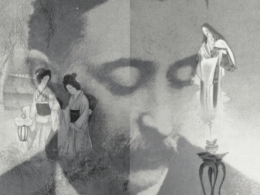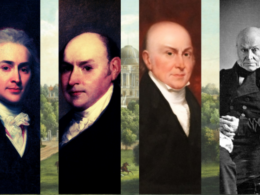This month The Library of America will publish Reinhold Niebuhr: Major Works on Religion and Politics, which gathers four of his books, along with writings on contemporary events from the 1920s to the 1960s, a selection of prayers, and sermons and lectures on faith and belief.
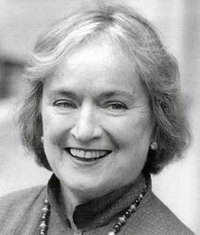
The volume is edited by Niebuhr’s daughter Elisabeth Sifton, an editor and book publisher for forty years and the author of The Serenity Prayer: Faith and Politics in Times of Peace and War. We recently interviewed Sifton on why Niebuhr’s writings continue to fascinate and challenge today’s readers.
LOA: What’s the aim of this collection, what sorts of pleasures, discoveries, and insights do you hope readers will find?
Sifton: Reinhold Niebuhr, my father, was a writer and thinker who engaged fully in his times—from 1914 and World War I, through the heady 1920s, into the Great Depression, then World War II, the “nuclear age” and the Cold War. This book shows how he wrestled with the spiritual and political issues of those times: many of them are with us still, and some are with us always. In America—where he was born and raised, his very German name notwithstanding—he worked for better working conditions for people caught up in the rush of industrialization, he called for social justice in all our communities, and he strove for better relations between races. In international affairs, he ceaselessly advocated policies that would lessen the risk of war, and he argued that a rich and newly powerful nation like the US should learn better how to conduct itself vis-à-vis other nations. I hope readers will find wisdom here that deepens their understanding of our world today.
LOA: Why Reinhold Niebuhr in The Library of America? How would you characterize his contribution/legacy? His influence?
Sifton: Niebuhr has been described as the most important American theologian of the twentieth century and as an especially influential American progressive. He knew how hard it was to alter entrenched power structures, but he combined his tough-minded political realism with a sympathetic understanding of society’s injustices and cruelties. Both his secular work and his theology became famous thanks to his memorable gifts as a public speaker, his huge productivity as a writer and teacher, and his frequent participation in national political discussions. In all these activities he never stopped being a pastor, which is how he started (he thought of himself more as a pastor than a theologian).
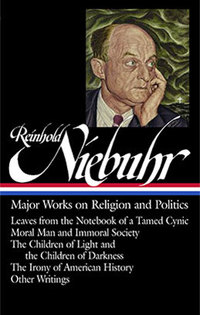
LOA: How would you characterize Niebuhr’s contribution as a public intellectual during the years covered by this volume?
Sifton: He tried to wake people up to the inequities and failures in American society. He thought it deplorable that Americans were by and large so self-confidently certain of their basic goodness—meanwhile ignoring not only their own inadequacies (sins?) but also the threats and dangers to American democracy and to the world—whether human (in the form of fascist dictators) or material (nuclear weapons). His sermons and speeches were famous for the clarity and urgent force he gave to his exploration of these themes. One key opinion that infused both his theological and secular work was that possessing superior power or force does not make a person or a state wiser or braver, but it does heighten the danger of sinful hubris.
LOA: As a religious thinker?
Sifton: I’m not qualified to answer this, but perhaps we can say that he sharpened and deepened the discourse about Christian ethics, Christian interpretations of the Gospels and Epistles, Christian understanding of secular society. He was a radical critic of much of American religious life, well known for the vigor with which he made his unclouded assessments. Again, he feared and decried the hubris of so many secular and religious leaders.
LOA: Did his thinking and writing fundamentally evolve over the years charted by the works in this collection?
Sifton: Yes, it did. When he wrote Moral Man and Immoral Society (1932) he considered himself a social-democratic Marxist, but the traumas and dangers of the Depression led him to rethink his Marxist presuppositions and reformulate his ideas on the dynamics of social change and betterment. And, as he writes in “An End to Illusions,” included in the volume, he resigned from the Socialist Party in 1940 because he couldn’t go along with its isolationist refusal to take action against the fascists threatening Europe. Thereafter one sees a deepening and refinement of his positions. He insisted always on the important distinction to be made between Communism and socialism.
LOA: The fame and influence of The Irony of American History (1952) have made Niebuhr’s contribution to an understanding of American foreign policy well known, but can his thought also be brought to bear on domestic political considerations—such as inequality in America?
Sifton: Yes, certainly. Indeed, Niebuhr believed that domestic and foreign policies were, and should be, related to each other; only despots or would-be despots separated them. As this book shows, America’s social-political-economic life, and the disparities separating rich and poor, were major concerns for Niebuhr from the very start of his ministry until his death a half-century later.
LOA: How might Niebuhr have responded to the widening gap between rich and poor that we see today?
Sifton: I can’t “channel” my father, but it’s clear in everything he wrote and did that he considered social and economic inequities as unethical, immoral, even sinful. And he denounced the self-delusions and proud deceits that people invoke to preserve them. One prayer, included in this volume, reads in part: “We confess the indifference and callousness with which we treat the sufferings and the insecurity of the poor, and the pettiness which mars the relations between us. May we with contrite hearts seek once more to purify our spirits, and to clarify our reason so that a fairer temple for the human spirit may be built in human society.”
LOA: How might Niebuhr have responded to the new sorts of religious extremism we see with al Qaeda and now ISIS?
Sifton: He frequently inveighed against religious fanaticism and against theocrats, whether Muslim, Christian, Jewish, or secular (as in the Soviet Union under Stalin). Al Qaeda and ISIS are new for us, but the history of violence-prone religious extremism is, tragically, as old as that of civilization itself. He could not have supported a foreign policy that requires America to battle jihadism around the globe while ignoring the social and spiritual strife that gives rise to it in the first place.
LOA: The LOA collection opens with Leaves from the Notebook of a Tamed Cynic (1929), a very personal and accessible book. How would you characterize its importance?
Sifton: Niebuhr in his old age would shake his head over the popularity of his first book. But it’s never gone out of print for good reason: these pages from the diary he kept at Bethel Church in Detroit in the 1920s are disarmingly honest about the emotional, psychological, and spiritual dilemmas faced by inexperienced young pastors, and ever since it first appeared almost ninety years ago, inexperienced young pastors, priests, and teachers have found its counsels wise and its candor refreshing.
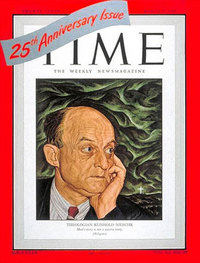
LOA: What does it tell us about Niebuhr’s only pastorate, and about his experiences in an ascendant Detroit?
Sifton: Well, Detroit wasn’t quite his only pastorate: when his pastor father died in 1913, he left divinity school and returned to Lincoln, Illinois, to fill in there for a time. But to answer the question, the book shows you his first encounters with brutal capitalism at full throttle, which is what Detroit was experiencing in the 1920s in the new automobile factories. He witnessed at first hand the spiritual crises that people face when unstable social and economic conditions encourage divisive politics. And it deeply affected him.
LOA: How did you decide which of the uncollected pieces to include?
Sifton: Few of the previous (and partial) collections of his writings included his copious journalism about national and international events as they occurred. We had hundreds of short articles to choose from, articles that were probably read by as many people as read his books or heard his sermons. I wanted to show them in chronological order, so that one could observe the speed and precision with which he addressed himself to crises in the headlines.
LOA: What’s the most interesting discovery you made in the course of putting the volume together?
Sifton: When I put the journalism together with the sermons and lectures, I began to see how he often approached a given theme or issue: first, maybe writing an essay about it or preaching on a Biblical text he thought relevant to it, then exploring it further in a lecture, writing about it some more, perhaps, and praying about it. This kind of recycling pattern allowed him to finish an incredible number of assignments in any given week, but also gave him a way to re-examine and deepen his initial ideas.
LOA: What’s the most important thing you learned as a writer and thinker from your father’s example?
Sifton: To be unafraid of prevailing, stifling orthodoxies.
LOA: Did he offer you practical advice?
Sifton: Not really, but the Serenity Prayer is the best possible form of daily instruction.
LOA: President Obama has expressed his great admiration for Niebuhr as a thinker. Would Niebuhr have returned the compliment?
Sifton: I am sure he’d have been happy to see such an intelligent, principled, brave black man in the White House—and a Democrat from Illinois, the state where he grew up, no less!
LOA: Do you have a favorite piece in the collection?
Sifton: My father preached more than once on the mysterious Parable of the Wheat and the Tares, so one version of such a sermon is included; it’s a great example of his theological and moral subtlety about human life. And my favorite paragraph in his writing comes from chapter 3 of The Irony of American History:
Nothing that is worth doing can be achieved in our lifetime; therefore we must be saved by hope. Nothing which is true or beautiful or good makes complete sense in any immediate context of history; therefore we must be saved by faith. Nothing we do, however virtuous, can be accomplished alone; therefore we are saved by love. No virtuous act is quite as virtuous from the standpoint of our friend or foe as it is from our standpoint. Therefore we must be saved by the final form of love which is forgiveness.
